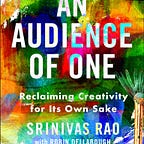The One Thing All Prolific Creators Have in Common
We don’t have a time management problem. We have an attention and energy management problem.
- We know that multi-tasking is destroying our brains
- We know that excessive social media use is the cognitive equivalent of being an athlete who smokes
Chances are quite high that if you’re reading this, you switched from some task that wasn’t satisfying your need for novelty. Even more paradoxically you switched from a task to read a post about why you shouldn’t do that.
If that’s the case you might be somewhat addicted to what author Chris Bailey refers to as productivity porn. You lull yourself into a false sense of productivity by reading about productivity.
There’s one pattern I’ve noticed across every prolific creator, whether they’re writers, musicians or artists. They know how to manage their attention and energy.
- Nearly all of the 7 habits of highly prolific writers are about managing energy and attention.
- Ryan Holiday is one of the most prolific writers and avid readers I know. A large part of his process is analog. You can read a bit about it here and here. I’m willing to bet that’s because it actually helps with energy and attention management.
- The bulk of my post about how writing 1000 words a day changed my life is about putting systems in place to manage energy and attention.
- Every article you’ll read about the habits of successful people will make mention of their ability to manage their energy and attention.
If we manage our energy and attention, time seems to take care of itself. So what does it take to manage our energy and attention.
1. Know your outcome
Most productivity systems fail because people aren’t sure what they’re trying to accomplish. I recommend adopting a North Star Metric, which the VP of Growth at Facebook talks about in one of these lectures. As a company, ours is 60,000 subscribers on our email list. It’s the one goal through which we filter all of our decisions. And as a result, new ideas don’t become the curse of progress.
2. Eliminate the Need for Willpower and Reduce Decision Fatigue
Willpower is limited and we’re often overdependent on it. Thus, we don’t accomplish as much as we could in a day. There are some simple things you can do to reduce the need for willpower, which I expand on in more detail in my post about mindful media consumption habits:
- Eliminate distracting apps
- Use software tools and browser extensions that block distractions
- Have a minimalist desktop and home screen on your phone
- Turn your phone off for a few hours each day.
- Eliminate variation from your day (same breakfast daily, same routine each morning)
3. Eat Well and Sleep Well
I’m no nutrition expert. But after an almost year-long battle with depression, largely the result of sleep deprivation I started to look closely at what disrupts our sleep. We’re connected to machines and staring at screens far longer than our brains have evolved to be able to handle. And screen time is addictive considering that nearly every website we visit is a dopamine machine
- Facebook likes and notifications release dopamine
- Retweets release dopamine
- Instagram likes release dopamine
- Seeing a new email in your inbox releases dopamine
And the worst thing is that dopamine feels amazing, and the satisfaction we get from it doesn’t last. So it’s no surprise that when we have this much dopamine coursing through our veins we have a hard time managing attention. Here a few ways to reduce screen time that are easy and effective.
- Put your phone in another room for a while
- Use a took like flux so that the light from your screen doesn’t screw you up
- Set a time in the evening to go from digital to analog (i.e. no devices after 7 pm)
- Develop a meditation habit.
Finally, eat well. Don’t overload yourself on sugar, carbs and caffeine. There are probably people who have written much more detailed and useful posts on nutrition so I’ll leave that to them.
If you’re wondering what the x-factor is that will send your productivity through the roof, it’s not an ability to manage time. It’s an ability to manage your attention and energy.
I’m the host and founder of The Unmistakable Creative Podcast.
Every Sunday we share the most unmistakable parts of the internet that we have discovered in The Sunday Quiver. Receive our next issue by signing up here
